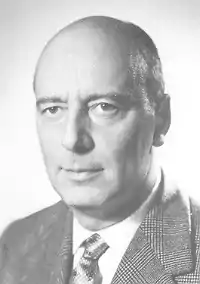Giancarlo Pajetta
Giancarlo Pajetta (June 24, 1911 – September 13, 1990) was an Italian communist politician.

Giancarlo Pajetta | |
|---|---|
 | |
| Member of the Chamber of Deputies | |
| In office 25 June 1946 – 13 September 1990 | |
| Member of the European Parliament | |
| In office 10 June 1979 – 18 June 1989 | |
| Personal details | |
| Born | 24 June 1911 Turin, Italy |
| Died | 13 September 1990 (aged 79) Rome, Italy |
| Nationality | Italian |
| Political party | PCI |
| Occupation | Journalist, politician |
Biography
Pajetta was born in a working-class district of Turin and became a member of the Italian Communist Party (Partito Comunista Italiano; PCI) during his youth, which led to him being sentenced to two years' imprisonment in 1927. He attended Liceo Classico Massimo d'Azeglio in Turin for his sixth form/senior high school studies.[1] In 1931, he went into exile in France, becoming the Italian representative of the Communist International.
In 1933 Pajetta secretly went to Parma on a mission to convince Fascist members to abandon their party, but was discovered, arrested and sentenced to 21 years' imprisonment. He was freed at the fall of the Fascist regime on August 23, 1943 and subsequently took part in the partisan resistance as a member of the Brigate Garibaldi.
In 1944, together with Ferruccio Parri and Alfredo Pizzoni, he was appointed president of the National Liberation Committee (Comitato di Liberazione Nazionale; CLN) in northern Italy, then still under German occupation. He also became Chief of Staff to the partisan military forces in the area.
In 1948 Pajetta became a member of the National Secretariat of the PCI, with responsibility for its international relationships; he remained a member until 1985. He represented the PCI in the lower house of the Italian Parliament from 1946 until his death, and was elected to the European Parliament in 1979 and 1984. He was a director of L'Unità (the PCI newspaper) and of the Marxist periodical Rinascita.
Pajetta was one of the most respected members of the PCI after World War II. He was a member of the migliorista (reformist) current alongside other figures such as Giorgio Amendola and Giorgio Napolitano, which often left him at odds with the party's leaders. Following the death of secretary Enrico Berlinguer in 1984, Pajetta was considered too old to succeed him. He later opposed Achille Occhetto's project of transforming the PCI into a social-democratic force (the future Democratic Party of the Left, or PDS).
Pajetta died suddenly in Rome in September 1990, before the dissolution of the PCI. His funeral ceremony was followed by some 200,000 people.
Bibliography
- Le crisi che ho vissuto (1982)
- Il ragazzo rosso (1983, autobiography)
- Il ragazzo rosso va alla guerra (1986)
References
- Ward, David. 'Primo Levi's Turin.' In: Gordon, Robert S.C. (editor). The Cambridge Companion to Primo Levi (Cambridge Companions to Literature). Cambridge University Press, 30 July 2007. ISBN 1139827405, 9781139827409. CITED: p. 11.
External links
- Biography (in Italian)